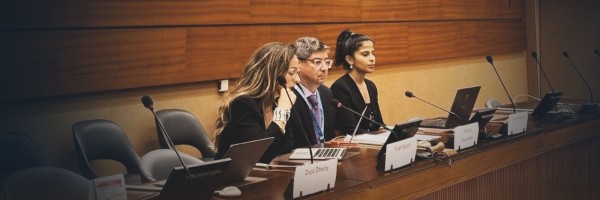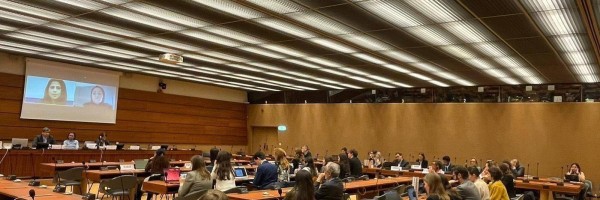During the United Nations Human Rights Council (HRC) 48th regular session, ALQST, Amnesty International, the Martin Ennals Foundation, and the Gulf Center for Human Rights (GCHR) collaborated to host a side event on 5 October 2021 called "Saudi Arabia: Taking stock of limitations of recent human rights reforms". The panel, moderated by Michael Khambatta, the Geneva Representative of GCHR, included international human rights organisation representatives as well as the sister of renowned Saudi human rights defender Loujain al-Hathloul, Lina al-Hathloul. The discussion detailed the Saudi authorities’ contradictory attitude toward upholding human rights norms and its stalled implementation of recommendations accepted during the 2018 Universal Periodic Review (UPR) process. Panelists unanimously highlighted the need for heightened international pressure to hold the Saudi authorities accountable, amidst their renewed crackdown on fundamental freedoms.
Joshua Cooper, Deputy Director of ALQST, was the first to speak among the panelists, highlighting the Saudi authorities' lack of progress in implementing recommendations from UN Member States which Saudi Arabia accepted during its 3rd Cycle UPR in 2018. ALQST, together with the Martin Ennals Foundation and GCHR, submitted a midterm evaluation during the reporting period in July 2021 to track the Saudi authorities’ progress in implementing UPR recommendations since 2018. Cooper spoke to the inherent incongruity between the 186 recommendations Saudi authorities accepted on paper versus the perpetuated culture of impunity and repression of human rights on the ground. Despite having accepted numerous recommendations on upholding freedom of expression, Saudi officials have continued to persecute human rights activists and peaceful critics in 2021, including Abdulrahman al-Sadhan and Mohammad al-Rabiah, through the ambiguously worded legislation of the Anti-Cybercrime and Counter-Terrorism laws. Executions in 2021 have already exceeded double the number in 2020, including the grossly unfair trial and execution of Saudi youth Mustafa al-Darwish in June for alleged offences committed when he was a minor. Cooper urged for heightened international pressure on Saudi authorities to progressively implement recommendations accepted from the 2018 UPR, in the face of the escalating pace of human rights violations and persecution of human rights defenders.
Lina al-Hathloul spoke of her personal experience living under an arbitrary travel ban, the fate of her entire family following her sister Loujain al-Hathloul's release earlier in 2021. She noted that the use of legally-unfounded travel bans is part of Saudi officials' modus operandi to collectively punish human rights activists and their families and to inhibit their reintegration into society following detention. Al-Hathloul specifically highlighted that travel bans isolate activists because they discourage individuals from associating with those blacklisted by the state, instigating fear that "they may be [persecuted] next". She recommended that international actors should not underestimate the power of judicial and arbitrary travel bans over released human rights defenders and their families. Advocating for the lifting of systematic travel bans should be equally prioritised as calling for release of prisoners of conscience and arbitrarily detained rights activists. Al-Hathloul voiced her belief that, as Saudi officials place tremendous value in their public image, mounting international attention on these abusive travel bans could go a long way to impede their use to persecute peaceful dissent.
Dana Ahmed, Middle East/Gulf researcher with Amnesty International, characterised the overall human rights situation in the kingdom as sharply deteriorating as the spotlight of the G20 Summit in 2020 has dimmed. Since November 2020, human rights defenders who have spent months or even years in pre-trial detention are finally being sentenced, with social media activity, posts and photo-sharing used as direct evidence in criminal trial proceedings. The Specialised Criminal Court (SCC) has sentenced more than five Saudi prisoners of conscience to between six and twenty years in prison, based on the Anti-Cybercrime and Counter-Terrorism legislation, since the beginning of 2021. Trials of human rights activists are marred by intransparent proceedings, and death penalty sentences have been handed despite clear evidence of torture and coerced confessions, in what can be characterised as gross violations of international law. Ahmed underscored that the increase in executions in 2021 has gone hand-in-hand with increased death penalty sentences in cases which are not punishable by death under Shari'a law. She called on international actors to urge Saudi Arabia to instill a moratorium on the death penalty, with the ultimate aim of abolishing it altogether.
Ahmed went on to expand on al-Hathloul's interventions on the use of arbitrary and judicial travel bans on human rights defenders post-detention. Travel bans perpetuate violations of fundamental rights, including free movement and association, and ostracise activists at the critical threshold of starting a new life following their release from prison . Those subjected to travel bans continue to be silenced after their release from detention, making it difficult for them to socially engage, find employment or otherwise rebuild their lives. Ahmed advocated that all travel bans on human rights defenders and their families, judicial and arbitrary, should be revoked, echoing al-Hathloul's call for greater pressure on Saudi officials to lift travel bans




